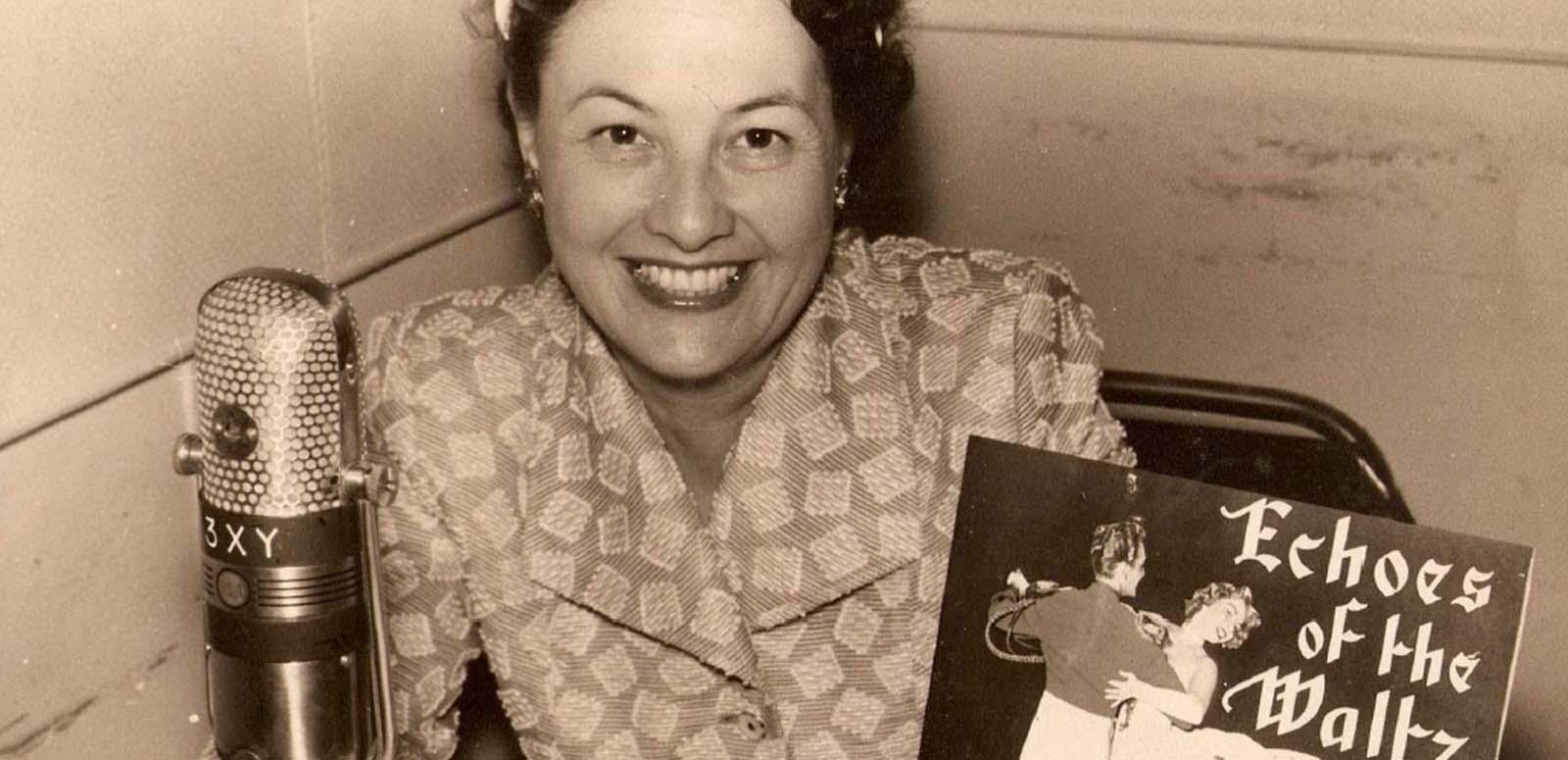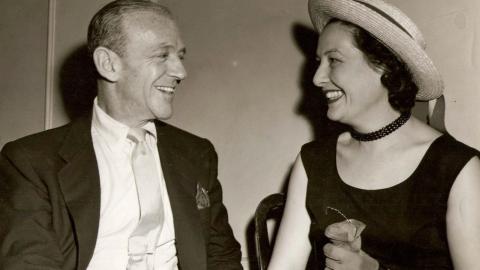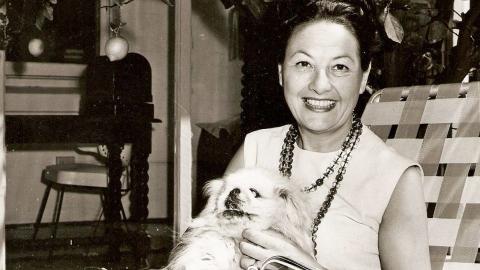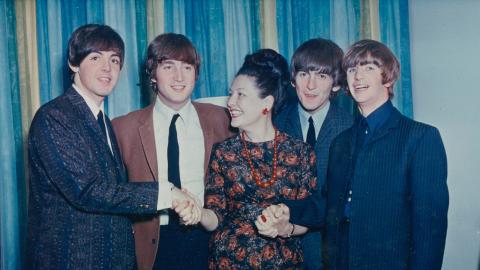

Happy birthday Binny!

100 years ago this week, on the second of February 1915, Rowena Bernice Lum was born in Adelaide to Lum Yow, a traditional Chinese medicine specialist well-known in the Adelaide area, and his Australian-born wife, Eleanora Laker.
Born eight years before the introduction of radio broadcasting to Australia and 41 years before mainstream television, Lum became a pioneer in these industries, working in radio for over 50 years and hosting the first daytime television program on Channel Nine.
Although based in Melbourne, Binny Lum (a nickname she adopted so the audience of her children’s radio program could pronounce her name more easily) travelled the world with her engineer and later husband Geoff Charter, working freelance and interviewing hundreds of people to be heard on her radio programs.
After Binny passed away in 2012, her family donated a large collection of these recordings to the NFSA, highlighted in previous articles on the NFSA website and SoundCloud page.
To celebrate the 100th anniversary of her birth, we’re publishing more interviews recently discovered by the family, on our SoundCloud page, as well as previously unheard recordings from Lum’s time overseas. These include interviews with people as varied as actors, musicians, chefs, Thai royalty, taxi drivers and journalists as well as field recordings from London, New York City and Hong Kong in the early 1960s.
BINNY AND GEOFF
Binny Lum’s husband Geoff Charter had a long career in radio himself, working in programming across several Melbourne stations.
I recently had the chance to chat to Geoff at the NFSA’s Melbourne office.

CHRIS ARNEIL: We’ve remembered Binny through these very specific interviews but she did do a whole lot more that wasn’t recorded.
GEOFF CHARTER: Most of the stuff she did here was just never recorded, it was all live. The stations never kept anything unless she requested it. There’s just so much material. Over the years, you know. She was doing VBN, which is the Victorian Broadcasting Network, that was all regional areas, and she did XY, DB, KZ, the ABC [and] AK. So, within all that, there was so much material.
I read she had 18 radio shows at a time.
Oh yeah. She never gave up. You know, I’d say, ‘Stop, slow down.’ ‘No, I enjoy it!’
And all of the TV work of course would have been live?
TV work was all live.
Not much surviving there too unfortunately.
No, I did get in touch with Channel 9 at one stage, and I said, ‘What about Thursday at One?’ You know, she started daytime television then, so I spoke to Des Ford – who was a producer there – and he said ‘Unfortunately Geoffrey, they’ve thrown them out.’ That’s what they did.
And in all of her jobs before she discovered radio too, I think she did some work for Crawfords, is that right?
Yes, she did acting, did radio plays on 3XY. Some very popular ones… One Man’s Family, that was very, very big. And other shows for Frank Thring, who then owned 3XY. Frank Thring Senior. Oh yes, she was acting, playing piano. She used to compère shows … on the corner of Bourke and Swanston Street, that used to be a place called Foy & Gibson, was a big retail store there, similar to Myer, David Jones, and she used to do a lunchtime compère there and play piano.
But radio was never the goal really?
Oh, radio she just sort of fell into, it just all progressed. She was never employed by anybody as such you know, paid a salary weekly. She was just totally freelance through everything she ever did.
And she liked it that way?
Yeah. Had no boss… No super… No sick leave… No nothing. That’s how tough she was. Incredible.
Was she ever given the opportunity to sign on to someone?
Oh yes, DB wanted her to sign on for some years, she filled in … there for about 18 months, and the management came to her and said ‘Would you like to do permanent?’ and she said ‘No, thank you, I’ll fill in.’ And after that … she found another station, went to XY for a short time as well, a couple of years, then she fell into the children’s session at KZ. She was just never out of work! Incredible.
And you met her when you were at 3KZ?
KZ, yep, when I was up there and she was doing a kids’ session there, and all the guys in the programming area said ‘She’ll never work on the kids’ show, she’s too haughty!’ [laughs] Little did we know, ignorant little monsters we were. She was a great success there.
What were you doing at 3KZ at the time?
I was … in the record library there doing programs, pulling out programs and doing all that sort of stuff, and doing announcing school and all that sort of rubbish, you know, you go through thinking ‘I’ll be the big announcer’, well, suddenly I didn’t want to be the big announcer. I was more interested in behind-the-scenes, you know.
How did the opportunity for doing these interviews with Binny come about?
I was working at AK at that stage doing … Channel 9 and AK, that’s when Henry Gay came over from 3UZ, because Channel 9 had just bought AK, and Henry said to me, ‘Look, do you want to come back to programming?’ and I said, ‘I’m doing music at Channel 9’, you know, that takes a hell of a lot of time, but I said I’ll help him out, you know, which I did for a while and then eventually I went over there full time, for a short period. Then … they went into Beautiful Music [changing format from Top 40 to easy listening] and I said ‘Urgh … not for me’.
So I said ‘Thanks, but no thanks’ and then I thought I’ll have a year off or something. Just before that happened AW wanted someone there to sort out their music, so I went over there, did that as a freelance, you know. They said ‘Look, can’t pay you full time’, I said ‘Suits me, I’ll just go up two, three days a week’. So I went there, and then Bin got an offer from Qantas, they said ‘Look, would you like to go on our inaugural [flight] through Hong Kong to London?’. So she said ‘I’ve got to have someone to handle all the equipment’ … So over we went, and that’s when I started recording all this stuff.
And were the interviews scheduled before you went over?
No. Nah, just had to go to someone and say ‘Look, how can I meet this person, how can I do that?’ One person that did help us considerably was Alan Freeman, the jock, well he set up the Beatles [interview] of course, but he also gave us access to all of Epstein’s other people, you know.
She seemed to do a lot of interviews at the Southern Cross Hotel, was that her choice or it was just where the interviewees were staying?
No, it’s just where they were staying.
So that’s the reason those survive, was because they weren’t in-studio?
Most of them, that’s right.
Did she do a lot of in-studio interviews too? People came in?
Oh yes, yeah. Yeah, she’d set up a weekly diary of what was happening.
Were there any interviews that you did that you ended up not using?
Yes, tape was so bad you just couldn’t.
Just for the quality of the recording?
Yeah, quality would be so bad.
What were you recording on?
On a Uher, a little Uher. But some of the tapes you got were, oh it was just terrible.
So this is the tape stock?
Yeah, tape stock wasn’t good.
And your trip to England, I read that you could only go if you talked to The Beatles?
Oh, what happened was we had a particular manager at AK at that stage, a man called David Joseph, who was very, very hard to get on with, and demanding, a man who had an ambition you wouldn’t believe. He insisted that I get some interviews with The Beatles or you don’t go. So I wouldn’t take that. And I said ‘Oh yeah, alright, I’ll get an interview with The Beatles’. So, over we go, and what we organised was that we chopped it up, because Binny had to have it for XY, and Joseph was insisting I get something for AK. He would dub a voice in, you know. I then went to the BBC after we’d done it, the next day, I set it up with [Alan] Freeman who booked me an engineering room with an engineer. And off I went, with my little tape held tightly, and previously, the night before, I’d done all the edits I wanted, you know, chopped it up fairly well. I got to the BBC and was hushed up to the engineering room, there’s a man in his white coat, he got his yellow chalk and I thought ‘Oh no, this is going to take ages’. And these enormous EMI consoles, you know, reel-to-reel. So there we sat, I said ‘this is where I want my cuts’.
So you weren’t allowed to touch the machine?
No. Oh, no way. But first we had to have the obligatory cup of tea [laughs] And I had to get this on an aircraft as soon as possible! Because Joseph would be jumping up and down and furious. And eventually got it done with a little chalk, split it, splice it, so we had two separate tapes. I eventually got to the post office and said ‘This has got to go ultra, ultra express’, they sent it off and Joseph got it, he rang me next day and said ‘Where is it, where is it?’. I said ‘I sent it last night, David’. So eventually it got there and they put a voice in with it.
They had different content in the recordings did they, when you chopped it up?
Yeah, I just chopped it up, different things. She had that lot and I had this lot. But eventually it all came together in the full thing.
Did they know about the other recording?
They did eventually.
Were they happy?
No! [laughs] But I didn’t care!
So, you must have had some idea of their popularity before you went over?
Oh yeah. I was getting reports from London, about this group, The Beatles, from [Alan] Freeman. He was writing over, and we used to get notes from him, saying ‘There’s a new group coming up – The Beatles’. ‘Oh, okay.’ That was the start of it, really.
And it wasn’t really Binny’s taste in music?
No, she’d never heard of them! And I said ‘Catch up, because you’re about to!’ And she absolutely loved them, and they loved her, as you can hear on the tape. And the way she set it up, knowing that I had to cut it up and edit it, she let them try and speak more, that’s why John’s saying at some stage ‘Ask us a question!’ or Ringo or someone. That was deliberate because we were trying to clean it, keep her voice out of it. I just had to twig and say ‘Just try to get it all out of them, doesn’t matter what they say, you know, just hold your finger up or whatever, anything!’
Did you have any recollections about Brian Epstein?
He was a man that was very quiet, very reticent. He didn’t want to do anything, an interview, he said ‘Oh no, you don’t want me’ and Bin insisted. He eventually did, and he was quite pleasant then, said what he had to say, he said ‘We’ll probably see you in Australia’ – which he did. He came in first, after we eventually got through the foyer, the girls screaming and phones ringing and telegraphists in tears, we got into this small little anteroom … and Epstein came out of his office and said ‘Oh hello, I’ve got the boys here, better come in’ but Paul at that stage had said ‘Look, I’ve gotta go, I’ve got an appointment’. He apologised, and that was it. Oh, it was frantic.
In terms of Binny working freelance, do you think much has changed since then in the industry?
No, I think today it’s more compartmentalised. But mainly for the digital age I think really, it’s just set this way and this is the way you do it. You don’t break the format. To me that’s too sterile, but that’s the way they work today, and all about money. When you look at radio today it’s totally different from when I was in it. As far as programming goes, it’s all very sterile as far as I’m concerned, you know, it’s the old DJ stuff, ‘Get in, get on, get off’.
Was there any one thing that pushed Binny out of the industry, do you think?
Oh, I think she was just getting sick of it really, because of what was going on, there was nothing there for her particular personality to get through.
That was in the ‘80s?
Yeah, mainly in the ‘80s. And I think she’d had a pretty good run, and she knew it too, and she said ‘Look, I’ll slow down’. She did some journalism, did some writing for the Leader group, and restaurant reviews.
But she managed to survive so many format changes.
Oh, god yes. And it’s a different thing these days, the personalities on the radio these days, the double acts on breakfast and drive and that sort of stuff.
And on your trips, did you carry the recorder at all times, in case you ran into anyone?
The day was so busy it was hanging on the shoulder anyway. You know, you’d go from one, to one, to one, and then maybe in-between, you’d have a cup of coffee or something, and then ‘Right, ready, cab!’ – off we go.
Was the Beatles tape the only one you sent back, or did you always take the tape back with you?
Oh, always took it back with me. Brought them all back. Then I got all the tapes back after they’d been used, and I sat down for about two months dubbing them, I suppose. Got a Marantz machine and away we went. Because all the tapes were sitting there in the drawer and I though ‘I’ve got to do that, they just can’t rot away’. And I just made an effort and … borrowed a Marantz from AK and I had a deck there, a tape-deck, and I dubbed it through.
That’s great, so it’s not an accident they survived.
No, that was deliberate. I said, ‘I’m not going to leave those’. Because there’s so much material that she’d done and I thought, ‘God, you’ve got to do something’. So I dubbed all that stuff.
Acknowledgements
Thanks to Sharon Terry and Geoff Charter for their generous donation of the Binny Lum collection of recordings and photographs and for sharing the stories about the life and career of Binny Lum.
The National Film and Sound Archive of Australia acknowledges Australia’s Aboriginal and Torres Strait Islander peoples as the Traditional Custodians of the land on which we work and live and gives respect to their Elders both past and present.


